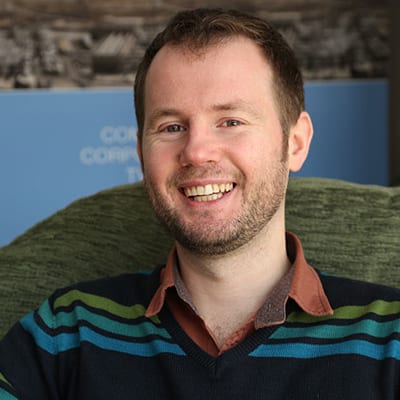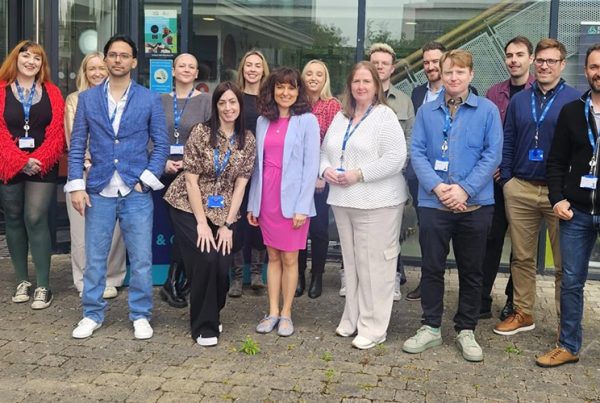
I founded my visual effects startup, Glue, in 2013 and was looking for a dedicated startup programme that would complement my industry experience with the business knowledge and structure I required. In 2014, I participated in Phase 1 of New Frontiers, and subsequently went on to Phase 2 later in the year.
I learned a huge amount on the programme and Glue is gaining momentum; we’ve been able to grow our team and develop custom systems to improve our processes. Looking back, I’ve identified seven areas that were key to my startup journey.
Building on an idea
New Frontiers was my first major step in starting up the business. Personally, I found it extremely helpful and challenging in so many ways. First of all, it challenges you to dismantle your idea and test to see if it’s a viable business model. This happens with group discussions, one-to-one meetings, review stages and presentations. Secondly, it helps you to build your idea from the ground up, while putting proven business theory into practice.
Creating processes
Establishing business processes was the most important aspect to benefit Glue. We have now developed processes and backend structures that allow us to keep track of projects and to clearly show both staff and clients how each project is progressing at the various stages. Not only this, but putting solid terms and conditions in place for new customers helps avoid confusion down the road. For us, it’s a simple ten-line document which lets both parties know where they stand before work commences. The help given by New Frontiers in streamlining this process alone has been invaluable.
Core team and culture
I also believe that culture is incredibly important, even at early-stage. I think every startup should make clear decisions about how their company will behave and ensure that all staff enjoy what they do and are happy with the work they’re producing.
So much of these thought processes have benefited from specific personality tests given during the programme to identify how an individual ticks and to develop symbiotic relationships between staff, based on their particular strengths and insights.
Knowing how you think and what type of person you are will allow you to understand how others perceive you. I have applied some of the lessons learned from the personality tests given throughout the programme to my whole team – with great results. This allows you to plan more efficiently and allows staff to identify qualities in each other that are necessary for delivering the best product.
Pitches and sales
There is a lot of great advice given regarding presentation skills, something I was quite poor at in the beginning but which I quickly improved upon through pitches to the class and at review stages. Basic things, such as having your pitch video recorded so you and your colleagues can dissect it and give constructive feedback, or being supplied with templates and pacing advice all come together to help you pitch better.
One very important factor in running a business is, of course, sales. How to successfully sell is paramount to the success of your business. There were many great tutors on the programme, such as Andrew McNeille and Dermot McKonkey, who both opened my eyes regarding sales and negotiating. I would happily purchase training videos from the tutors on this programme, simply because the information given is so in-depth; I still find myself looking over class notes from time to time.
Learn
A lot comes down to the individual entrepreneur, but if you are driven to make your business a success you’ll find that there’s a huge amount of information available to you on the programme. From the basics of structuring everything you do to clearly defining goals and milestones, you will learn many elements to help you set up and run your business.
Mentoring was a great help, as were the one-to-one sit downs with experienced professionals – which allow you to review each stage you have reached and gain great insight and knowledge.
Focus
The €15,000 grant paid over the course of Phase 2 (six months) gives you the space to concentrate on your business idea and give it the time and focus it needs to develop.
Network
For a digital video creation company like mine, the networking aspect has been especially helpful. Not only to share experiences and advice with like-minded entrepreneurs, but also as a test bed for us to sell our services.
New Frontiers gives you information on many business events throughout the course. Managing your time effectively is certainly one of the most difficult aspects, but ultimately the most rewarding as you learn and develop under their structured guidance.
Anyone can learn how to start up a business, but having the right mentors and structure around you will make the process easier and help it to happen sooner. Even if you know that you have a viable product or service, it requires a certain mindset to take the leap – especially if you have been working for someone else for years. It can be daunting at first, but my advice is to jump!
About the author
 Ray Mongey
Ray Mongey
Ray was a New Frontiers participant at DIT and is founder and Managing Director of Glue, a visual effects company. The vision behind Glue was to combine techniques and technologies from video games, animation and filmmaking to provide the kind of blockbuster effects usually only available from big studios. They work on all types of project – from films to exhibitions, safety training videos to service/product explainer videos and anything in between. By enhancing videos with 3D animation, Glue creates a more engaging, immersive experience – although always with an eye on keeping production time and costs down.
 Ray Mongey
Ray Mongey








